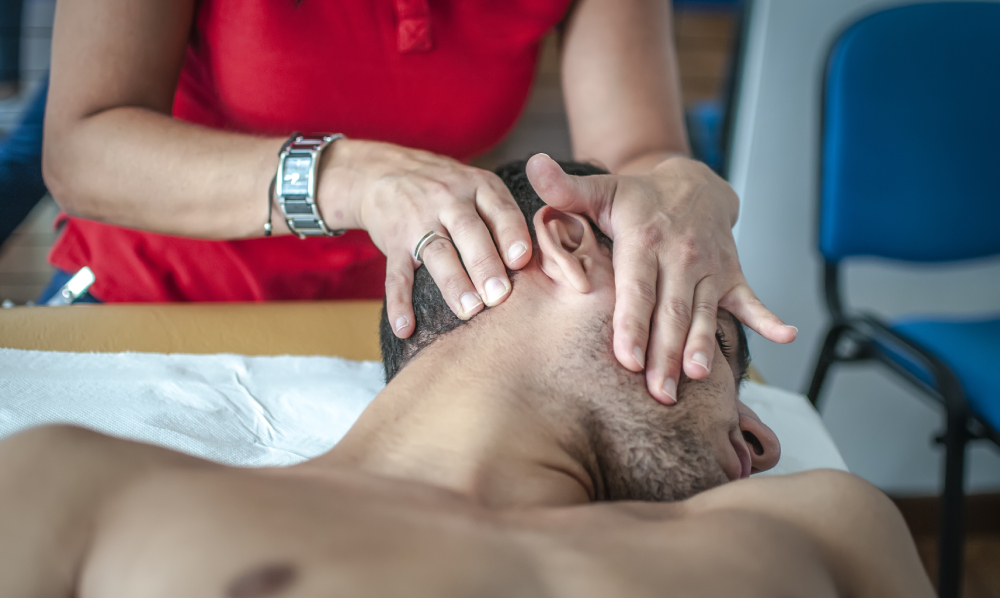What Is Trigger Point Therapy?
Trigger point therapy, a specialized massage therapy, focuses on detecting and releasing trigger points. These are specific areas in the muscle that cause pain and discomfort, often called knots. This therapy is highly regarded for treating muscle pain and improving muscle function. Let’s delve into the details of trigger point therapy:
- Understanding Trigger Points
- Definition: Trigger points are sensitive muscle or connective tissue (fascia) areas that become painful when compressed.
- Causes: Often develop due to muscle overuse, injury, inflammation, trauma, or stress.
- Symptoms: Can cause localized pain, referred pain, muscle stiffness, and can limit the range of motion.
- The Therapy Process
- Identification: The therapist locates the trigger points by palpating the muscles and identifying areas of tightness.
- Techniques: Involves applying pressure to these points to alleviate the tension and pain. This can be done using fingers, knuckles, or tools designed for trigger point therapy.
- Release: The goal is to release the tension in these knots, reducing pain and improving muscle function.
- Procedure and Techniques
- Direct Pressure: The therapist applies direct pressure to the trigger point and holds it for a period, often causing an initial increase in discomfort before relief.
- Ischemic Compression: A common technique where sustained pressure is applied to relax the muscle.
- Stretch and Spray Technique: Involves spraying a cooling agent on the muscle, followed by stretching.
- Benefits of Trigger Point Therapy
- Pain Relief: Effective in reducing pain in the local area and areas that receive referred pain.
- Increased Range of Motion: Helps in restoring flexibility and movement.
- Reduced Muscle Tension: Helps in relieving muscle tightness and stiffness.
- Holistic Improvement: Reducing chronic pain can improve overall physical and mental well-being.
- Risks and Side Effects
- Temporary Discomfort: Initial discomfort at the point of pressure is expected.
- Bruising: This can occur, especially in sensitive individuals.
- Overstimulation: Excessive treatment may lead to increased muscle soreness.
- Who Should Avoid It
- Those with Certain Medical Conditions: Like bleeding disorders, deep vein thrombosis, or severe osteoporosis.
- Skin Conditions: Open wounds or skin infections in the area to be treated.
- Finding a Qualified Therapist
- Qualifications: Seek therapists who are specifically trained in trigger point therapy.
- Experience: Experienced therapists can identify and effectively treat trigger points.
- Referrals and Reviews: Sites like BestAcupuncturistOC.com can be excellent resources for finding qualified therapists and providing user reviews and therapist profiles.
- Conclusion
Trigger point therapy offers a targeted approach to treating muscle pain, with the potential for significant relief and improved muscle function. Engaging with a qualified therapist is crucial to ensure the therapy is effective and safe. Platforms like BestAcupuncturistOC.com can assist in locating experienced practitioners in this field.
This detailed examination of trigger point therapy highlights its methodology, benefits, and considerations, emphasizing the importance of seeking treatment from qualified professionals.
Conditions Treated
- Pain Conditions: Musculoskeletal Pain (back, neck, knee, shoulder, elbow, etc.), Arthritis, Migraines, Headaches, Sports Injuries, Fibromyalgia, TMJ, Post-Operative Recovery, Nervous System Disorders.
- Respiratory Disorders: Asthma, Allergies, Sinus Problems.
- Gastrointestinal Disorders: Irritable Bowel Syndrome, Food Allergies, Ulcers, Gastritis, Acid Reflux, Indigestion, Constipation/Diarrhea.
- Women’s Health: Infertility, PMS, Menstrual Irregularities, Endometriosis, Poly Cystic Ovarian Syndrome, Menopause, Hormonal Imbalances, Pregnancy Conditions, Postpartum, Reproductive Disorders, Breech Baby.
- Men’s Health: Incontinence, Reproductive Disorders, Prostate Problems.
- Children’s Health: Coughs, Colic, Allergies, ADD/ADHD, Sleep Disorders, Digestive Problems, Fever/Flu/Colds, Stomach Aches/Nausea, Headaches, Bed Wetting.
- Addictions: Smoking, Cravings, Drug, Alcohol.
- Mental/Emotional: Depression, Anxiety, Insomnia, Sleep Disturbances, Stress.


